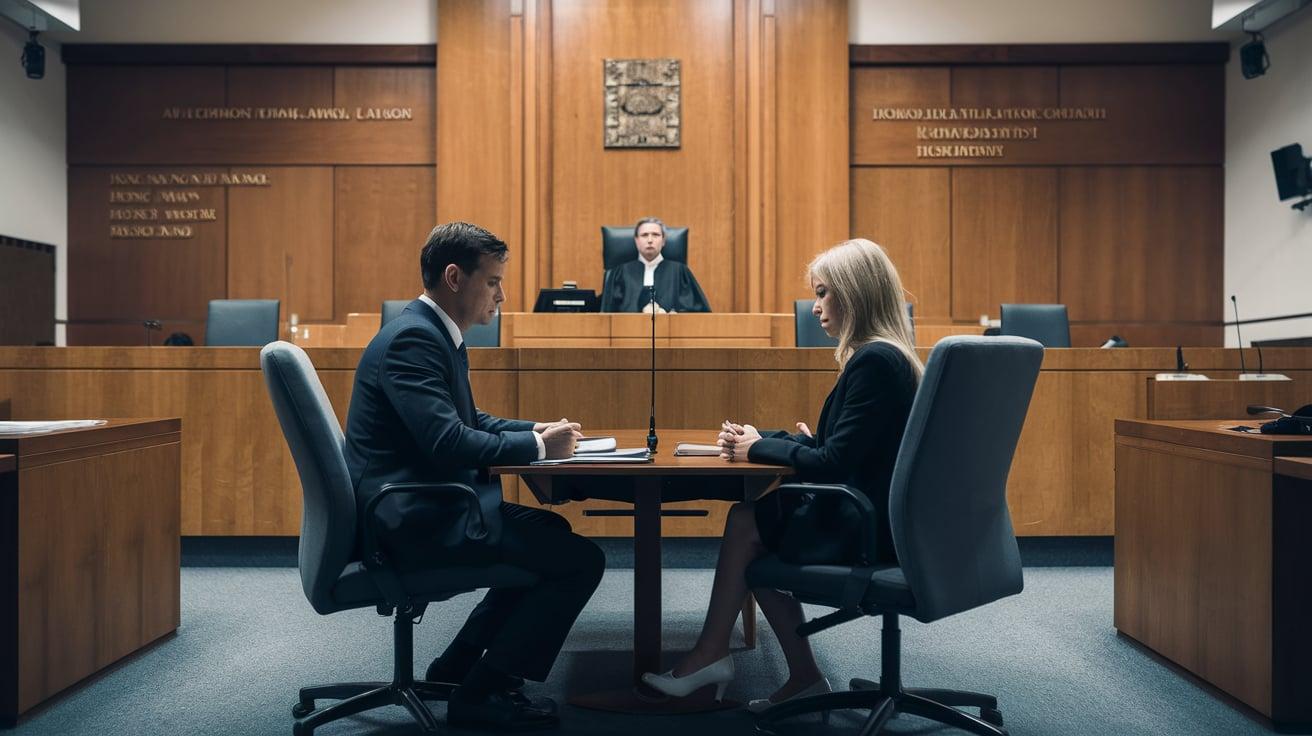Ending a marriage brings emotional and legal challenges that many California couples face each year. The traditional court process can be costly and time-consuming, often adding stress to an already difficult situation.
Mediation offers a different path – one that puts control back in the hands of both parties while reducing expenses and time.
This method helps couples work through their differences with a neutral third party, leading to better outcomes for everyone involved.
Through mediation, couples can reach fair agreements on asset division, support arrangements, and child custody matters.
The process allows both parties to voice their concerns and work toward solutions that meet their needs.
Why Choose Mediation for Your Divorce

Most California cases finish within three to six months. This timing helps meet the state’s required six-month waiting period between filing and finalizing a divorce.
California courts keep mediation details private, unlike regular court cases that become part of public files. During sessions, couples can talk openly with their mediator about their needs.
Couples who choose mediation often maintain better relationships afterward, which proves especially helpful when children are involved. Parents learn to work as a team for their children’s benefit.
Both parties make their own choices rather than letting a judge decide. This helps create plans that fit each family’s needs better than standard court orders might.
The law lets mediating couples set their own pace. Unlike courtroom battles, discussions stay confidential between the couple and their mediator.
This setup creates a space where both parties can speak openly about their needs and concerns. The process typically costs less than going to court, as couples share the expense of one mediator rather than paying for separate lawyers.
Most cases wrap up within three to six months, compared to the year or more that court proceedings might take.
The private nature of mediation keeps personal matters out of public records.
This control over the outcome often leads to agreements that work better for everyone in the long run.
Types of Divorce Mediation

1. Private Mediation
Private mediators work directly with couples outside the court system. These professionals set their own schedules and can spend as much time as needed on each case.
Couples have the freedom to choose their mediator and can meet in comfortable, private offices rather than court buildings, with flexible timings.
Sessions often last 2-3 hours and can cover all divorce matters, including property, support, and custody. Private mediators help create detailed agreements that fit each family’s specific needs.
2. Court-Connected Mediation
California courts offer mediation services, often required for parents who disagree about child custody or visitation. These sessions focus mainly on parenting issues and typically provide one or two free sessions.
Court mediators help parents create workable custody plans that serve their children’s needs. They offer specific guidance about local custody laws and court expectations.
If parents reach an agreement, the mediator can write them up for the judge’s review right away. Court mediation usually follows strict time limits, with sessions lasting about two hours.
3. Online Mediation
Remote mediation sessions take place through video calls. This option works well for couples who live far apart or have busy schedules.
Mediators use secure platforms to share and sign documents electronically. Couples can join sessions from separate locations, making the process more comfortable.
Screen sharing helps when reviewing financial documents or draft agreements. Most online mediators offer technical support before the first session.
4. Shuttle Mediation
Some couples prefer not to meet in the same room. In shuttle mediation, the mediator meets with each person separately and moves between rooms to share information and proposals.
This type helps couples who find direct communication difficult but still want to avoid court. Each person gets private time to express concerns and consider options without pressure.
The mediator filters communication to keep talks productive and focused on solutions. This method works well for couples with high conflict or strong emotions. Sessions might take longer but often lead to better agreements.
5. Co-Mediation
Co-mediation involves two professionals, often one with a legal background and the other with counseling expertise.
This method addresses both legal and emotional aspects of divorce, with the legal expert handling property division and support calculations while the counselor focuses on communication and parenting plans.
Though more costly, co-mediators model effective communication, spot creative solutions, and provide extra emotional support, making it ideal for complex cases or couples needing additional guidance.
What to Expect During Mediation Sessions

- Initial Meeting: The first session focuses on understanding both parties’ goals and concerns. The mediator explains the process rules and helps set a productive tone for future meetings.
- Financial Information Exchange: Both parties share important documents about income, debts, and assets. The mediator helps organize this information to make sure everyone has a clear view of the financial situation.
- Issue Identification: The mediator helps list all topics that need attention, from property division to child custody. This step creates a clear roadmap for discussions and ensures no important matters get overlooked.
- Discussion and Problem-Solving: Each session tackles specific issues one at a time. The mediator guides the conversation, helping both parties express their needs and work toward a middle ground on each topic.
- Agreement Development: As decisions are made, the mediator drafts sections of the agreement. Both parties review these drafts and can suggest changes until the terms feel fair and workable.
- Final Review: The last session involves going through the complete agreement. Both parties can ask questions and request final adjustments before the document moves forward for legal processing.
The Role of Attorneys in Mediation

Attorneys can play a supportive role in mediation while letting couples lead their own negotiations. A lawyer may serve as a consultant, reviewing agreements and offering legal advice without being present at mediation sessions.
This approach helps keep costs down while still providing legal protection for both parties. Many couples choose to meet with their own attorneys between mediation sessions.
These meetings help each person understand their legal rights and make sure the developing agreements protect their interests.
The attorneys can point out potential problems or suggest helpful additions to the agreement. Some people worry that bringing attorneys into mediation will make the process more difficult.
However, lawyers who understand mediation often help smooth the path to agreement. They can explain legal requirements, suggest solutions based on their experience, and make sure all necessary paperwork meets court standards.
Before signing any final agreements, each person should have their own attorney review the documents. This review serves as a safety check to make sure the deal follows California law and covers all needed topics.
The attorneys can then help file the paperwork with the court to complete the divorce process.
An Average Cost of Divorce Mediation in California
The total cost of divorce mediation depends on several key factors that vary for each couple. Most mediators charge by the hour, with rates ranging from $300 to $800 in California. Some offer package deals that cover a set number of sessions.
The time needed for mediation affects the overall cost. Simple cases might need just 3-4 sessions, while more complex situations could take 8-10 meetings. Each session typically lasts two to three hours.
The number of issues to resolve and how well couples can work together directly impacts the total time needed. Property division can change the cost structure.
Cases involving businesses, multiple properties, or complex investments may need extra sessions. The mediator might also suggest bringing in outside experts like property appraisers or accountants, which adds to the total expense.
Child custody matters can extend the mediation process. Creating parenting plans and discussing support arrangements often need careful attention and multiple sessions.
However, even with these extra discussions, mediation usually costs 40-60% less than going to court.
Document preparation makes up another part of the cost. Some mediators include paperwork preparation in their fees, while others charge extra for drafting agreements and court documents.
Many couples find it helpful to consider the cost of having individual attorneys review their final agreements.
What Happens After Mediation

Document Creation by Mediator
- The mediator prepares a Memorandum of Understanding
- The document lists all agreements reached during mediation sessions
- Both parties get copies to review
- Includes complete details about property, support, and parenting plans
Attorney Review Stage
- Each person’s lawyer reviews the memorandum
- Attorneys check if agreements follow California laws
- Lawyers suggest changes if needed to protect client interests
- Final adjustments make agreements clear and complete
Court Filing Process
- Submit divorce petition and response
- Include all mediation agreements
- Attach the required supporting documents
- Court checks if paperwork meets legal standards
Final Steps to Divorce
- The six-month waiting period begins once papers are served
- Parties must adhere to mediated agreements during the waiting period
- The judge reviews and approves the final documents
- Agreements become official court orders, and non-compliance may result in penalties
Challenges in Divorce Mediation and How to Overcome Them
| Issue | Solution |
|---|---|
| Communication Problems | The mediator sets ground rules for discussions, ensuring each person gets time to speak. Short breaks during tough moments help maintain focus on problem-solving rather than arguing. |
| Uneven Financial Knowledge | Mediators provide both parties with copies of all financial records. They may also suggest bringing in financial experts to explain complex matters in simple terms. |
| Strong Emotions | Mediators allow space for feelings like sadness, anger, and fear. They may recommend short breaks between topics or suggest counseling between sessions. |
| Hidden Assets | Mediators require both parties to sign statements confirming full financial disclosure. Financial experts may review records to ensure nothing is missed. |
| Power Differences | Mediators ensure both parties have equal time to speak and understand their rights. They may suggest consulting attorneys to help build confidence in legal matters. |
| Children’s Needs | Mediators focus on the children’s well-being, guiding parents toward solutions that work for everyone. They provide information on how different arrangements affect children. |
Conclusion
Divorce mediation offers a clear path through one of life’s most challenging transitions. This method puts you in control of important decisions about your future, from financial arrangements to parenting plans.
While the process may have its challenging moments, the benefits of lower costs, faster resolution, and better long-term relationships make it worth considering.
Before starting mediation, take time to gather your financial documents, think about your priorities, and consider what matters most for your future.
Speaking with a family law attorney about your specific situation can help you prepare for mediation. Remember, successful mediation depends on both parties working together to find solutions.
Want to learn more about starting the mediation process? Contact your local family court services or speak with a certified mediator about your specific needs.
Frequently Asked Questions
What is the Downside to Divorce Mediation?
Mediation may not work if couples can’t talk openly with each other. It also takes longer when parties disagree often. Success depends on both people working together and sharing honest information.
When to Not Use Mediation?
Skip mediation if there’s domestic abuse, one party hides money, or someone refuses to negotiate fairly. Cases with substance abuse problems also need court oversight instead of mediation.
Can You Refuse Mediation in a Divorce?
Yes, you can refuse private mediation and choose court instead. However, in California, parents must attend court-ordered mediation for child custody matters regardless of their preference.








